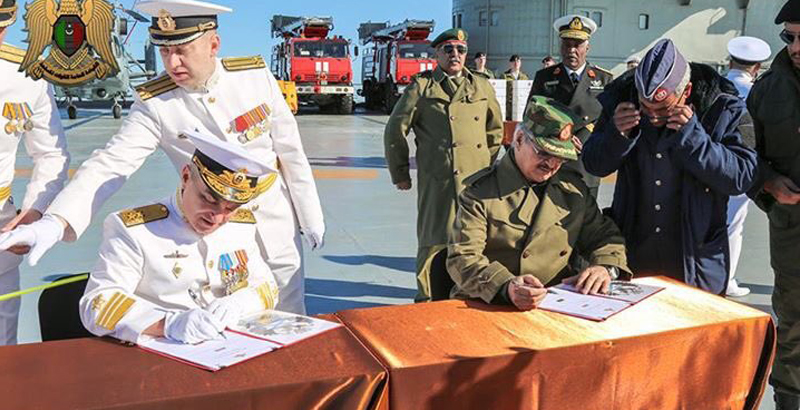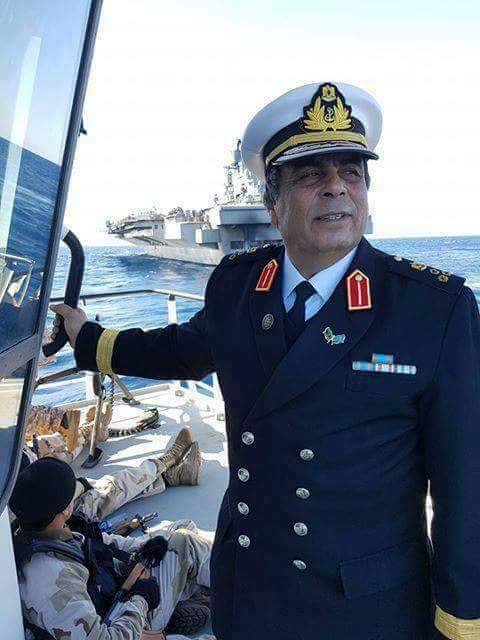According to head of the Russian Federation Council’s defense committee, Viktor Ozerov, Russia is not conducting talks on creating military bases in Libya.

Commander of the Libyan Armed Forces, General Khalifa Haftar (R), and Deputy Commander of the Russian Northern Fleet, Vice Admiral Victor Sokolov (L), on the deck of the Admiral Kuznetsov heavy aircraft-carrying missile cruiser
Russia is not conducting talks on creating military bases in Libya, the Sputnik news agency reported on Sunday, citing head of the Russian Federation Council’s defense committee, Viktor Ozerov.
“Such talks are not being conducted,” Ozerov told Sputnik.
Earlier, Libyan media reported that Chief of the General Staff of the Russian Armed Forces, Valery Gerasimov, and a number of Russian military officials allegedly arrived to the Libyan city of Tobruk in order to hold talks with Supreme Commander of the Libyan Armed Forces, General Khalifa Haftar. According to the Switzerland’s Neu Zuercher Zeitung newspaper, citing Italian and Gulf media, during his visit to the Russia’s Admiral Kuznetsov heavy aircraft-carrying missile cruiser, the Libyan General had allegedly signed an agreement, reflecting Moscow’s interest in creating bases in the cities of Benghazi and Tobruk.
Later, a video and photos (can be seen below), showing Haftar on the deck of the Admiral Kuznetsov, were published online. Reportedly, the Libyan General met with Deputy Commander of the Russian Northern Fleet, Vice Admiral Victor Sokolov, and held remote talks with Russian Defense Minister Sergey Shoygu.
Haftar is a protege of the Central Intelligence Agency (CIA), who was introduced into the rebel camp during the aggression against Libya. During the war of 2011, he rose quickly, arming a large number of people, using CIA money. Later, after the elimination of the Jamahiriya system, Americans relied on other people and Haftar became one of the sides of the local civil war, opposing the government in Tripoli and Misrata’s groups. He solved problems with financing, taking control over a number of key coastal ports, through which Libyan oil is exported at dumped prices. At the same time, his troops continue to fight against terrorists, who pretend to Benghazi and a number of its surrounding towns.
After the loss of the former US support, Haftar looks for other sources of the external legitimacy, as well as other sources of funding. His visit to Moscow in November 2016 is an important stage in this issue. Haftorah is interested in supplies of weapons and rising of his international legitimacy in the framework of competition with other factions, fighting for influence and control over oil flows in the country. In exchange, most likely, he offers Russia various opportunities to ensure its military presence on the territory of Libya, as well as a chance to demonstrate its military and political activity in the Mediterranean, through which a flow of refugees moves to Europe.
We should understand that Russian military activity in Libya would make NATO nervous, as French and Italian troops are currently stationed in the country, and, until recently, US troops also took part in operations in the coastal areas of the country. It is possible that Russia’s attempt to gain a foothold in Libya, using Haftorah, will be announced as an ‘aggressive threat to the southern flank of NATO’.
Russia’s benefits from investment in Haftorah are enough abstractive, though it is understandable why the negotiations are held with him now – at the moment, Haftorah controls the main flows of the Libyan oil’s export. Judging by the reports about the last meeting between Russian military officials and Haftorah, he managed to interest the Russian side with something and, most likely, now Russia conducts exploratory talks on the current situation in Libya and finds out whether the country should be involved in it.
Photos of the meeting between Supreme Commander of the Libyan Armed Forces, General Khalifa Haftar, and Russian military officials on the deck of the Russia’s Admiral Kuznetsov heavy aircraft-carrying missile cruiser:

















Yeah, such a development would cause a great ‘shitting down both pant-legs’ of NATO. The sooner the better.
Considering how America and the EU did a “hit and run” . An effort to stabilize by Egypt with Russian backing looks lie a very smart move .
Every when we pick blogs that we read. Listed beneath would be the newest internet sites that we pick out.
http://www.caramembuatwebsiteku.com